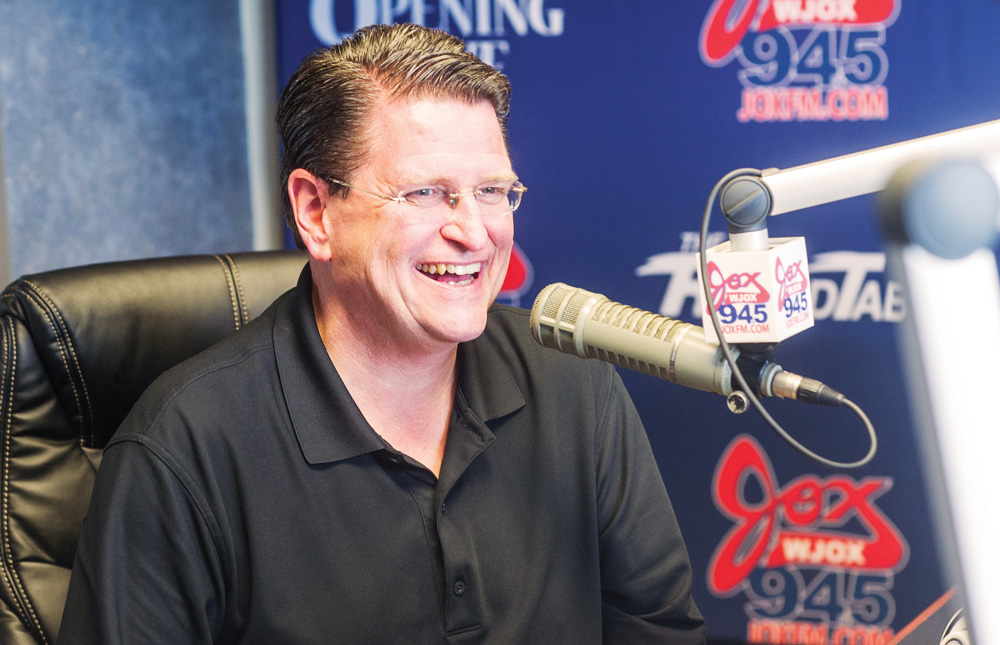 Mark Ricketts, M.D., didn’t go into internal medicine with the goal of becoming a sports radio personality. Yet if you tune into Birmingham’s WJOX 94.5 on Wednesdays at 12:20 p.m., you can hear “Doc on JOX,” his 30-minute health segment, which has been airing during The Roundtable once a week for five years.
Mark Ricketts, M.D., didn’t go into internal medicine with the goal of becoming a sports radio personality. Yet if you tune into Birmingham’s WJOX 94.5 on Wednesdays at 12:20 p.m., you can hear “Doc on JOX,” his 30-minute health segment, which has been airing during The Roundtable once a week for five years.“Lance Taylor and Ian Fitzsimmons, originally The Roundtable’s hosts, were patients of mine as students when I practiced and taught in Tuscaloosa,” says Ricketts, a 1987 graduate of the School of Medicine at UAB. “They had heard me field health questions from listeners on a Sunday morning program on Alabama Public Radio and asked, ‘Why don’t you do that on our show?’”
Tuning Into Information
Ricketts saw the JOX segment as a great opportunity to use his UAB training and years of clinical and managerial experience to reach a broad range of people, including some without health insurance or access to care. He opens each segment with a brief discussion of a topical concern—high blood pressure or diabetes, for instance—that might affect many listeners, and then takes listener calls.“I’m not paid, so it frees me up as to what I talk about,” says Ricketts, who also earned a dual M.B.A./M.P.H. degree from UAB in 1997, helped to create Tuscaloosa’s University Internal Medicine Group, and continues to serve in the Air Force Reserve. “The segment and calls are all spontaneous. Usually the Roundtable guys haven’t seen the topic I’m going to talk about. I try to address problems I see in the field and bring that information to the airwaves.”
The show has earned him new patients and even may have helped save a few lives. Follow-up appointments with some callers have led to the discovery of treatable conditions that could have been serious without medical care, Ricketts says.
Putting Creativity Into Practice
The “Doc on JOX” has found a few other creative ways to break down barriers between physician and patient. When he opened his Vestavia practice, Ricketts designed the facility to appeal to patients, down to the paint on the exam room walls. “I knew the research on colors that patients consider calming, and for years, I had listened to patients describe what they did and didn’t like about doctors’ offices.”Ricketts also uses pagers like the ones in restaurants, which tell customers when their table is ready. “If patients want to come in early and have lunch next door, they can take a beeper, and we will buzz when it’s time for their appointment,” he explains.
Principle Inspiration
He may have inventive approaches to interacting with patients, but Ricketts says he is an internist in the time-honored tradition of Tinsley R. Harrison, M.D., one of School of Medicine’s pioneering medical giants. “I keep Dr. Harrison’s principles framed in my office to remind me daily of what I am doing here and of our goals when it comes to treating patients,” says Ricketts.His practice and the radio show feed off each other, he says. “The better job that I do at the office, then the more experienced I become—I’ve been at this for 23 years—and the better my expertise is in knowing what’s going on with patients and in the community. All of that makes me better when I’m at the microphone. There, I can’t be thinking that I am talking to 100,000 to 200,000 people. During that 30 minutes, I try to concentrate on each caller and his or her question.”
It all boils down to another teaching concept that Tinsley Harrison always stressed, says Ricketts: If you listen to patients, they will tell you what’s wrong.
This article, written by Jo Lynn Orr, originally appeared in the Winter 2014 edition of UAB Medicine Magazine.